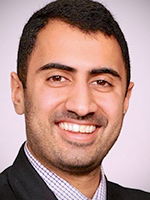
Research seeks to reduce high rates of heart failure re-hospitalization.
Twenty-nine year old south Vancouver resident Marc Bains has the best health interests of others – even total strangers – at heart. Bains, a business and marketing development professional, is a regular participant in health research, including clinical trials seeking to improve his heart health.
"I say yes to participating in research because I want people to benefit from devices or medication from the studies that I take part in,” says Marc Bains. “Anything I can do to help not only myself, but patients in the future, I’m willing to do – no problem.”

Bains’s willingness and fearlessness around clinical trials participation is informed by his own experience in the health care system.
“The things that Vancouver General Hospital, St. Paul’s Hospital, and Vancouver Coastal Health have provided me with in terms of care and research – those things wouldn’t have been possible without trials or research in the past,” he says.
Clinical trial investigates more accurate tool to personalize heart failure treatment
Bains learns about clinical trials through his cardiologist, Dr. Sean Virani, who is currently recruiting patients for a National Institutes of Health-funded clinical trial called Guide It. The trial looks to see whether or not a traditional approach for follow-up care after heart failure hospitalization (i.e. seeing a heart failure specialist, being assessed for medications and investigations, etc.) is better than or equal to a novel strategy that includes the addition of a B-type natriuretic peptide (BNP) blood test.
“We know that once you’ve been admitted into hospital for heart failure in B.C., the likelihood that you’re going to get re-hospitalized within the next year is 25%,” says Dr. Virani, founding director of the Heart Failure and Cardiology-Oncology Programs at Vancouver General Hospital and Regional Director of Heart Failure Services for Vancouver Coastal Health/Providence Health Care.
“Certainly what we also know is that patients who are treated in trials like Guide It get higher touch care – they have access to clinical research coordinators and staff who really are interested in their symptoms and want to help them avoid hospitalization.”
Even though BNP blood testing is regularly used clinically to confirm the diagnosis and assess severity of heart failure, it is not currently part of standard follow-up care for patients who have been hospitalized for heart failure. Guide It asks the question: does BNP help guide and optimize follow-up treatment?

“This trial is really trying to provide an objective measure to the patients’ signs and symptoms to help guide our heart failure therapies because we know from a variety of other studies that our bedside assessment is actually quite poor,” says Dr. Virani, who is also the Heart Failure Physician Lead for Cardiac Services BC and a Clinical Assistant Professor of Medicine at the University of British Columbia. “We need additional tools to help us manage these patients because for many of them, we may think they’re doing much better or worse than they actually are. The BNP gives us additional insights on how our treatments are impacting their disease .”
“This trial offers a novel way of looking at how patients can be treated and more importantly, it aims to ensure that they’re getting the most effective and aggressive treatment as possible,” adds Dr. Virani.
“What we’ve seen in similar kinds of studies is that patients tend to get treated more aggressively if the clinician has an objective measure of their disease severity. This is an opportunity for patients to be appropriately treated more aggressively using BNP as a guide.”
Guide It has already started enrolling patients and is seeking a total of 1,100 participants from across North America. To qualify, patient participants must have been hospitalized due primarily to heart failure within the last six months. They also need to have had a BNP performed to confirm that they had heart failure and there must be documentation that the patient has some impaired heart function (i.e. left ventricular function of less than 40%).


